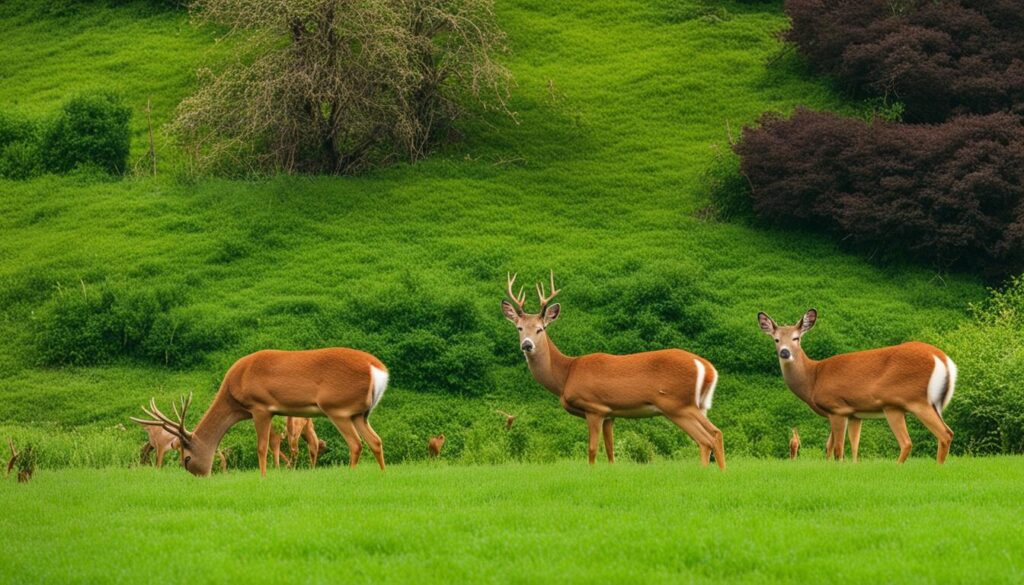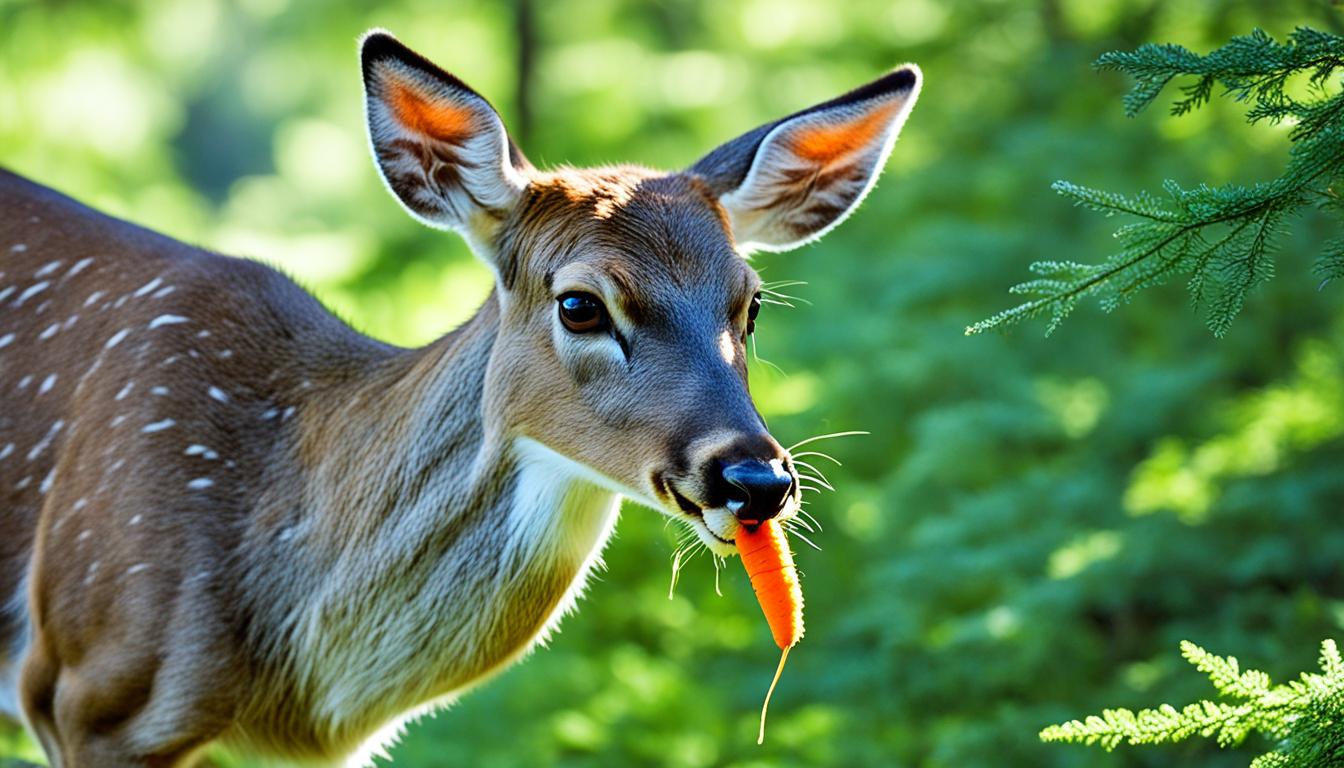Deer are fascinating creatures with unique food preferences. While their natural diet consists of leaves, twigs, and shoots, they can also enjoy the occasional carrot as part of their nutrition. In this article, we explore whether deer can safely eat carrots, their benefits to wildlife nutrition, and how to responsibly feed carrots to deer.
Feeding carrots to deer can provide them with essential vitamins, fiber, antioxidants, minerals, and energy. Carrots are particularly rich in vitamins A and C, which support deer’s overall health, including improved vision, immune system support, healthy bones and teeth, and a strong digestive system.
However, it’s crucial to introduce carrots gradually into their diet to avoid disruptions and negative health effects. Deer have sensitive digestive systems that require time to adapt to new foods. Sudden and excessive introduction of carrots or any other new food can cause digestive disturbances and negatively impact their health.
While carrots are a beneficial addition to deer’s diet, it’s important to remember that they should not solely rely on handouts or human-produced foods. Feeding deer should be done responsibly, considering the natural balance of ecosystems, the impact on wildlife behavior and health, and local laws and regulations.
Content Highlights
ToggleKey Takeaways:
- Deer can safely eat carrots as part of their diet.
- Carrots provide essential vitamins, fiber, antioxidants, minerals, and energy for deer.
- Introduce carrots gradually to avoid disruptions to deer’s digestive system.
- Feeding deer should be done responsibly, in consultation with wildlife experts.
- Support natural habitat enhancement for deer by planting trees, shrubs, and native vegetation.
Do Carrots Attract Deer?
Carrots have a sweet aroma that attracts deer, and their ability to dig up the roots from the ground makes them an irresistible treat for these animals. Deer are often drawn to areas where carrots are present due to their strong sense of smell and the allure of this delicious vegetable.
When deer discover a carrot patch, they can quickly develop a fondness for this food. A large herd of deer can easily decimate a carrot crop, leaving gardeners frustrated and disappointed. If you want to protect your garden from deer and preserve your harvest, it’s important to take measures to deter them from feasting on your precious carrots.

To safeguard your garden and prevent deer from being attracted to your carrots, consider implementing various protective measures. The following strategies can help:
- Install deer fencing or erect a physical barrier around your garden to prevent deer from accessing your carrot patch. Proper fencing should be at least 8 feet high and extended underground to deter them from digging beneath it.
- Use repellents that emit a scent that deer find unappealing. These can include commercial products or natural remedies such as a mixture of hot pepper spray, garlic, or predator urine. Applying these repellents around your carrot plants can deter deer from approaching.
- Plant deer-resistant varieties of carrots that have a high level of natural compounds that are unappealing to deer. These varieties often have a stronger taste or scent that discourages deer from feeding on them.
- Consider companion planting by growing other plants in close proximity to your carrot patch that naturally repel deer. Examples include marigolds, mint, or lavender.
By implementing these protective measures, you can create a garden that is less enticing to deer and increase the chances of preserving your carrot harvest for yourself.
“By implementing these protective measures, you can create a garden that is less enticing to deer and increase the chances of preserving your carrot harvest for yourself.”
How to Safely Feed Deer Carrots?
While deer can safely eat carrots, it’s important to feed them in a controlled and gradual manner. Deer have sensitive digestive systems that require time to adapt to new foods. Sudden and excessive introduction of carrots or any other new food can cause digestive disturbances and negatively impact their health.
To safely feed deer carrots, follow these steps:
- Start by introducing small portions of carrots. Begin with a few carrot pieces and observe how the deer respond to them.
- If the deer show no signs of adverse reactions, gradually increase the amount of carrots over a period of 3-4 weeks. This slow progression allows their digestive system to adapt to the new food.
- Monitor the deer’s health and behavior closely during the transition period. If they exhibit any signs of digestive issues or discomfort, reduce the amount of carrots or discontinue feeding them entirely.
- Remember that carrots should only be a small portion of the deer’s overall diet. Their natural diet consists of leaves, twigs, and shoots, so it’s important to provide a balanced variety of foods.
Feeding deer should be done responsibly and in consultation with local wildlife authorities or wildlife rehabilitation experts. They can provide guidance on the appropriate quantities and frequencies of carrot feeding based on the specific needs of the deer population in your area.
By following these guidelines, you can ensure that the deer benefit from the nutritional value of carrots while minimizing the risk of digestive disturbances or other health issues.
| Benefits of Feeding Deer Carrots: |
|---|
| 1. Provides essential nutrients such as vitamins (A and C), fiber, antioxidants, and minerals. |
| 2. Supports improved vision, immune system function, and overall health. |
| 3. Contributes to the development of healthy bones and teeth in deer. |
| 4. Helps maintain a strong digestive system. |

Remember, feeding deer carrots should be done responsibly and in moderation to ensure a well-balanced diet for these beautiful creatures.
Conclusion
In conclusion, deer can safely eat carrots as part of their diet. Carrots provide essential nutrients and health benefits for deer, including vitamins, fiber, antioxidants, minerals, and energy. While their natural diet consists of leaves, twigs, and shoots, deer are adaptable and can enjoy carrots as a nutritious addition to their food preferences and wildlife nutrition requirements.
However, it’s important to introduce carrots gradually into their diet and ensure that they are not solely reliant on handouts or human-produced foods. Feeding deer should be done responsibly, taking into consideration the natural balance of ecosystems and the impact on wildlife behavior and health. It is also important to adhere to local laws and regulations regarding wildlife feeding.
Instead of solely relying on feeding carrots, it’s recommended to support natural habitat enhancement for deer by planting trees, shrubs, and native vegetation that they naturally gravitate towards. This way, deer can have a diverse and well-rounded diet, reflecting their natural food preferences and providing essential nutrition for their optimal health.
- California Deer Hunting Guide: Seasons, Rules, Permits, and More - 26 June 2024
- Arkansas Deer Season 2024 [Schedules, Licenses, Bag Limits & More!] - 26 June 2024
- 2024 Arizona Deer Season New Dates & Rules! - 25 June 2024




